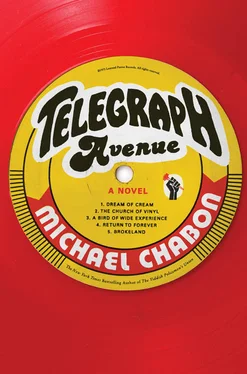“I mean, at least you know Archy didn’t fuck her.”
Gwen said, at least that.
“So, wait, you really are quitting?” Nat said, the news seeping in along with the first fizzy milligrams of panic and dismay. For years his life had balanced like the world of legend on the backs of great elephants, which stood on the back of a giant turtle; the elephants were his partnership with Archy, and Aviva’s with Gwen, and the turtle was his belief that real and ordinary friendship between black people and white people was possible, at least here, on the streets of the minor kingdom of Brokeland, California. Here along the water margin, along the borderlands, along the vague and crooked frontier of Telegraph Avenue. Now that foundational pileup of bonds and beliefs was tottering, toppling like the tower of circus elephants in Dumbo. Not because anybody was a racist. There was no tragic misunderstanding, rooted in centuries of slavery and injustice. No one was lobbing vile epithets, reverting to atavistic tribalisms. The differences in class and education among the four of them canceled out without regard for stereotype or cultural expectation: Aviva and Archy both had been raised by blue-collar aunts who worked hard to send them to lower-tier colleges. The white guy was the high school dropout, the black woman upper-middle-class and expensively educated. It just turned out that a tower of elephants and turtles was no way to try to hold up a world.
“You think I was playing with the poor woman, saying I was quitting when I’m not?”
“No.”
“Nat, do you seriously think I was taunting her?”
“No, ma’am.”
Sounding annoyed, she said: “So, okay, you went back to the store.”
He told her how he had found himself alone in the horror that was the aftermath of Mr. Jones’s wake. Bones and scattered beans, puddled sauces inter-oozing on discarded plates in Mandelbrot sets of grease and tomato. A stack of uneaten tortillas swollen and curling like the pages of a book that had fallen into the bathtub. And Cochise Jones officially and forever dead. Over everything, over life itself, that sense of encroaching shadow Nat was always left with when someone he loved had died. A dimming, the world’s bulb browned out. He remembered taking Julie to the Gardner Museum on a trip to Boston a few years earlier, seeing a rectangle of paler wallpaper against the time-aged wall where a stolen Rembrandt once hung, a portrait of the very thing that perched atop the stool where Mr. Jones used to sit: emptiness itself. Empty cans, empty bottles, empty store, empty night, Nat’s empty life lived fruitlessly and in vain.
“A Nat Jaffe alone,” Gwen summarized, “is a dangerous thing.”
“Bitch,” Nat said, trying to jaunt himself out of it. “I’m always alone.”
“Hello, and welcome to another exciting episode of Existential Drama Queen. ”
“Born alone, die alone.”
Nat keeping up his end by saying what was in his heart, leaving out only the secret central event of his proposed human time line, namely Do a bunch of stupid shit alone, repeatedly, because you can’t control your dumb-ass self .
“Okay, now,” Gwen said, “ease up, big guy.”
On the dilapidated sign of Steele’s Scuba, a ghostly diver confronted the lost submarine mysteries of Telegraph Avenue. Gwen slowed as the bus in front of them knelt like a cow before the newborn Jesus to take on, was it, yes, the Stephen Hawking guy. Nat watched the poor bastard increment himself and his chair, patient and stubborn, onto the bus’s power lift. Talk about alone. But look at him, dude was unstoppable, ubiquitous. Basically, a head on a meat stalk, strapped into a go-kart, motherfucker would take a bus to Triton if AC Transit ever put it on a route. Nat might have felt ashamed of the self-pity in which he currently wallowed, if self-pity knew any shame. He looked away, left, right, and then, tasting his hangover at the back of his mouth like a flavor of dread, up at the sky. Afraid he might see above him, at any moment, the evidence of last night’s stupid shit, looming and vengeful as Spiny Norman in the old Monty Python sketch.
“Whatever,” Nat said. “I’m going to tell this or not?”
“Let me guess. You started drinking.”
“I found a six-pack of warm Corona. Some miracle it didn’t get drunk.”
Nat had opened the first beer, found a slice of lemon, poked it through the mouth of the beer can. Knocked the photograph of Mr. Jones from its ceremonious stool with a satisfying sense of desecration. Got up into the old man’s chosen spot, maybe trying to dispel the emptiness that had gathered there. Figuring he would wait for Archy, who lived in his own personal CP time zone, his own little Guam of lateness. In the meantime have a beer, try to think his existential drama-queen way out of—or anyway, around—the situation. Then, for sure, do a little cleaning up.
By the fourth Corona, Archy had not showed or called, the store was no nearer to being clean, and Nat no longer bothered with the lemon. The goal was still to think his way out of or around the situation, but by this point, admittedly, his grasp of the complexity of the situation was pretty diminished. The improvidence, carelessness, and lack of acumen that he and Archy had shown in operating their business; their tendency to view the taking on of responsibility for every task, errand, or chore that Brokeland Records required—to conduct their lives, mutual and individual—as a prolonged if not infinite game of chicken, each waiting for the other to blink, to give in; the rise of electronic file sharing of digital music; the low revenue generated by the bargain-hunting and transient crew of dormitory DJs and homeboy mix-tapers who made up the greater share of their customer base, far outnumbering the high-roller collectors; the collapse of the Japanese and overseas markets generally; not to mention Archy’s evident dissatisfaction with the nature of their partnership and the algae bloom of financial panic, of provider anxiety, in the normally tranquil pond water of Archy’s soul: All these proximate and precipitating causes of the imminent failure of Brokeland Records seemed by the fourth Corona to have been rinsed from Nat’s mind, leaving only a mildew-black residue of rage against Gibson Goode. Alcohol as helpful to the making of scapegoats as mud to the shaping of golems.
When the beer was gone, Nat poked around amid the dead soldiers stacked on and under the folding tables until he came up with a bottle of Hungarian slivovitz, God knew who had brought it. It was a quarter full. Nat sloshed a little into a red hot-and-cold cup, then quickly knocked back two or possibly three shots. Slivovitz was the cordial of grief, the mourner’s brandy. Nat could remember his newly widowed father, the first Julius, lost in a helpless scrum of uncles in somebody’s kitchen after his first wife’s funeral, gasping at the fire in his chest as the slivovitz went down.
Nat climbed back onto Mr. Jones’s stool with his glass of burning wine, put on A Love Supreme. Reliably, it destroyed him. Yes, it had passages of lyric majesty, passages that embodied the modernist union of difficulty and primitivism, and some kind of groove beyond groove, funk beyond funk; and yes, it had been intended as a kaddish of sorts, an expression of praise in the face of all sorrow for the Creator of John Coltrane, with thanks from His magnificent creation; but to Nat, it had always come off as music that was—like Nat himself— secretly powered by currents of rage. Probably that was a projection of Nat’s own feelings toward his own fucked-up Creator, some lesser cousin twice removed of the Perfect Being that had made John William Coltrane. But as he listened to the A-side, with its furious repetitions, the saxophone bashing itself over and over against some invisible barrier, a bee at a windowpane seeking ingress or escape, Nat felt his low-frequency rage with motherfucking Gibson Goode and his motherfucking Dogpile Thang begin to spike. The stylus dragged itself to the locked groove, and he needed to take a piss, and it was at this point, as far as he could remember, that he decided it would be a good idea to forgo the routine pleasure of pissing in his own toilet, in the bathroom behind the curtain with its bug-eyed portrait of Miles Davis. He decided that he would walk down to the future site of the Dogpile Thang and piss on that instead.
Читать дальше
Конец ознакомительного отрывка
Купить книгу












